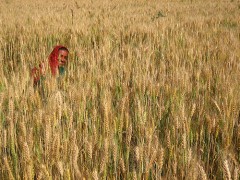The weather is our finance minister: climate change in the developing world

[Session: Managing Adaptation to Climate Change in the Developing World]
As climate change begins to create a more volatile and violent environment in the developing world with sweeping impacts for rural, agricultural and impoverished communities, is the best solution new technological innovation, and further high-skill management systems? It seems not. The world over, indigenous and agricultural communities have over the course of millennia developed knowledge of local, independent methods for coping with the natural vicissitudes of their environments. Supporting devolved adaptation methods and technologies at the personal and community level is the way to build a flexible, responsive and fast-acting system.
What one speaker called our “arrogant, aggressive, engineering-centric mindframe” has guided us in our construction of a globally interdependent system that, while it has doubtless provided incalculable benefit for innumerable people, has also taught all of us (rich and poor) to depend for our sustenance on knowledge, products and technologies produced and managed elsewhere. This system, when it functions well, is amazing to watch. But when the context in which it was built changes suddenly, its many hurdles and weaknesses become abundantly clear.
Let’s take the production of mass quantities of highly-productive and genetically-uniform crops as only one example. This practice may enable us to feed many more people under a strict set of conditions than would a diversified crop portfolio, but it may also immediately collapse under changed conditions, leaving with nothing those communities that depend on it. Crops that depend on insect pollination, crops that require maturation times or germination temperatures within fairly narrow ranges…hyper-dependence on only one such crop can be a death sentence in times of sudden change. The appropriate solution to a changing climate marked by increasing variability is not, clearly, the development of further genetically-uniform crops for mass production that depend on a reliable set of inputs to be productive. This does not respond to the increasing volatility that we see.
Enormous portions of the global population have learned over millennia how to spread their risk, diversifying their resources where possible and coping with volatility and adversity. Our global romance with technology and our logistical prowess have the effect of stripping from those communities the tacit learning that supports those development mechanisms. For all of us, it makes us more comfortable 95% of the time, but it leaves us ruined in the remaining 5%. Is the ultimate technological solution just around the corner, or will further technological fixes take us farther from the flexible, diversified system we need to respond to our volatile world?
Speakers:
Colin Chartres, Director General, International Water Management Institute
Peter Höppe, Head of Geo Risks Research Department and Corporate Climate Center, Munich RE
Eric Stark Maskin, Nobel Laureate; Professor of Economics, Institute for Advanced Study
Sunita Narain, Director, Indian Centre for Science and Environment; Director, Society for Environmental Communications
Judi W. Wakhungu, Executive Director, African Centre for Technology Studies (ACTS)
